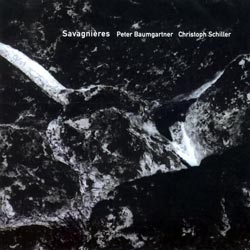
We live in a time where a powerbook — a laptop computer — is branded a legitimate musical instrument. Stating the obvious, perhaps, but it's almost bemusing, perhaps patently absurd, how casually this is taken for granted, particularly since the powerbook's performer is really playing software and manipulating a mouse rather than plucking a string, hitting a drum, or blowing into a horn. Yes, synth players have in essence operated with a similar maxim, but the laptop's infinite versatility belies its patent facelessness. Peter Baumgartner is the man on 'top here, paired with Christoph Schiller, who is credited with utilizing 'spinett' (sic), a harpsichord-like instrument which Schiller bends, arches, and tweaks in ways the spinet's maker likely never imagined. Thrust into the digital realms of Baumgartner's machine-made environment, Schiller's sonic tool handily complements his partner's latent hums and pensive soft-synth coagulations.
Five untitled tracks are plainly marked on the booklet by their individual lengths, each in tandem epitomizing where contemporary electroacoustic improv sits, and how it functions as an categorical entity, on the praxis of modern-day music. The near 20-minute title track is a veritable model of digital economy and acoustic means. Baumgartner and Schiller volley sounds at one another with little regard for simpatico gestures; the former either births dark-hued synth hums or plangent whoops and hollers for the latter to prattle and screech over, or leaves great gaps of silence for Schiller to mussy about in. Sonic nomenclature is largely abandoned; all is effect, residual or otherwise. Travelling in long, sustained vacuums ultimately does both artist's few favors; if anything, such pregnant pauses seem to reveal more a paucity of genuine ideas than overt acts of creation. When the two do gel, once that long second piece approaches the halfway point, at least the applecart appears moderately upset, Schiller strumming the spinet's upper body to achieve percussive attacks that are then sprinkled over the bell-like trilling Baumgartner lays down as foundation. As his partner tugs more and more sci-fi noises out of his p-book, Schiller responds with equally noxious sounds of his own; it's a shaky apotheosis, and not altogether convincing, but it satisfies nonetheless.
Even as the recording progresses, it must again be questioned how well sessions such as this one are mic'ed, recorded, and ultimately doled out for those listeners not present at the event itself. Schiller's random acoustics exude much within this context, but what little decay or sustain they have seems incongruous in the pristine overlay Baumgartner devises. Were it a more maximal music, the cracks between Savagnières' prickly ideals would be so emphasized as to provide the whole recording with more pronounced "force" and a certifiable heft - instead, the reductionism on tap here gets downright wonky, booking regularity rather than power.
Comments and Feedback:



More Recent Reviews, Articles, and Interviews @ The Squid's Ear...


|

